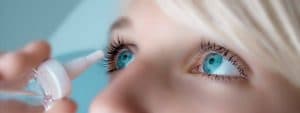Pollen is not the only cause of allergies that can affect your eyes and make wearing contact lenses uncomfortable.
Dust, mold, smoke, and pet dander can also cause allergic reactions in the eye.
If you have any concerns regarding wearing contacts lenses with allergies, contact your nearest eye doctor to find answers to all your questions.
SEE RELATED: Eye Allergies and Contact Lenses
Here are some commonly asked questions of eye doctors regarding allergies and contact lenses.
#1 I have allergies, can I still wear contact lenses?
Yes, you may find daily disposables are more comfortable.
Since contact lenses attract airborne allergens, if you wear the same pair for a month, they accumulate a month’s worth of allergens and debris. Whereas disposable daily lenses are worn for just one day, giving allergens less time to accumulate.
#2 If I have allergies, how often should I clean my contact lenses?
Cleaning your contact lenses often will help keep them clean of allergens. Use preservative-free solutions because some people develop allergies to preservatives.
#3 My allergies cause dry eyes. What should I do?
Keep your eyes moist with artificial tears. They will help keep your eyes from drying out, which causes additional discomfort. Use only preservative-free eye drops; otherwise, you may experience an adverse reaction to the preservatives.
Contact an eye doctor near you who can advise which drops are best for you and how frequently to apply them.
#4 If I have eye allergies, can I still wear makeup?
Use hypoallergenic creams and cosmetics to decrease allergic reactions, especially if you apply them around your eyes.
Moisture particles from sweat and tears can bring the cosmetics that you place around your eyse into contact with the eye’s surface.
#5 If I have an allergy attack, can I still wear my contacts?
During an allergy reaction, it is recommended to refrain entirely from wearing contact lenses if your eyes are itchy, red, and swollen from an allergy.
#6 Should I take anti-allergy medications to reduce my symptoms?
While anti-allergy medications (antihistamines) reduce your allergy symptoms, they can cause dry eyes, which can exacerbate your symptoms.
If you have any known allergies, inform your eye doctor at the time of your eye exam, so they can recommend lenses that are more suited to your sensitive eyes, which products to use and how to care for your lenses.
LEARN MORE: Guide to Eye Conditions
Schedule an eye exam with an eye doctor near who can help you choose the best contact lenses for your eyes and lifestyle.

